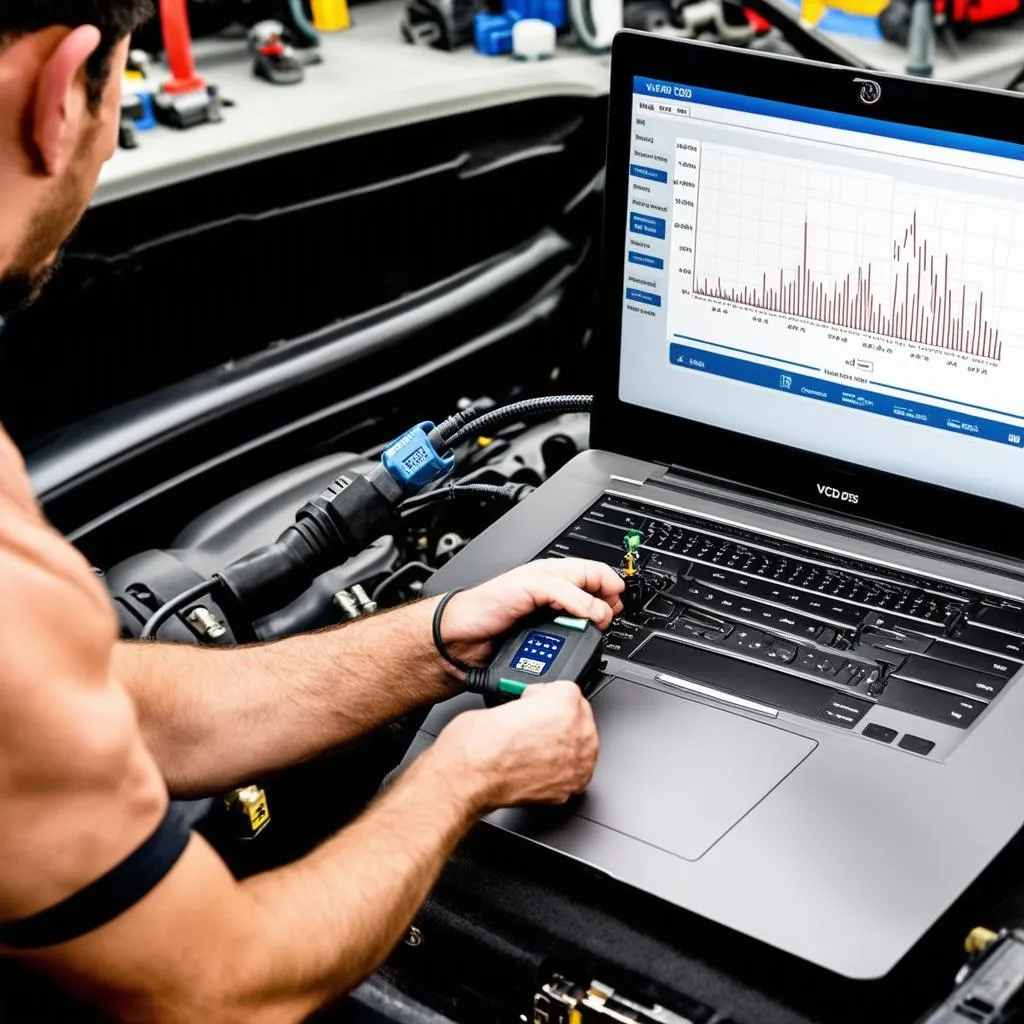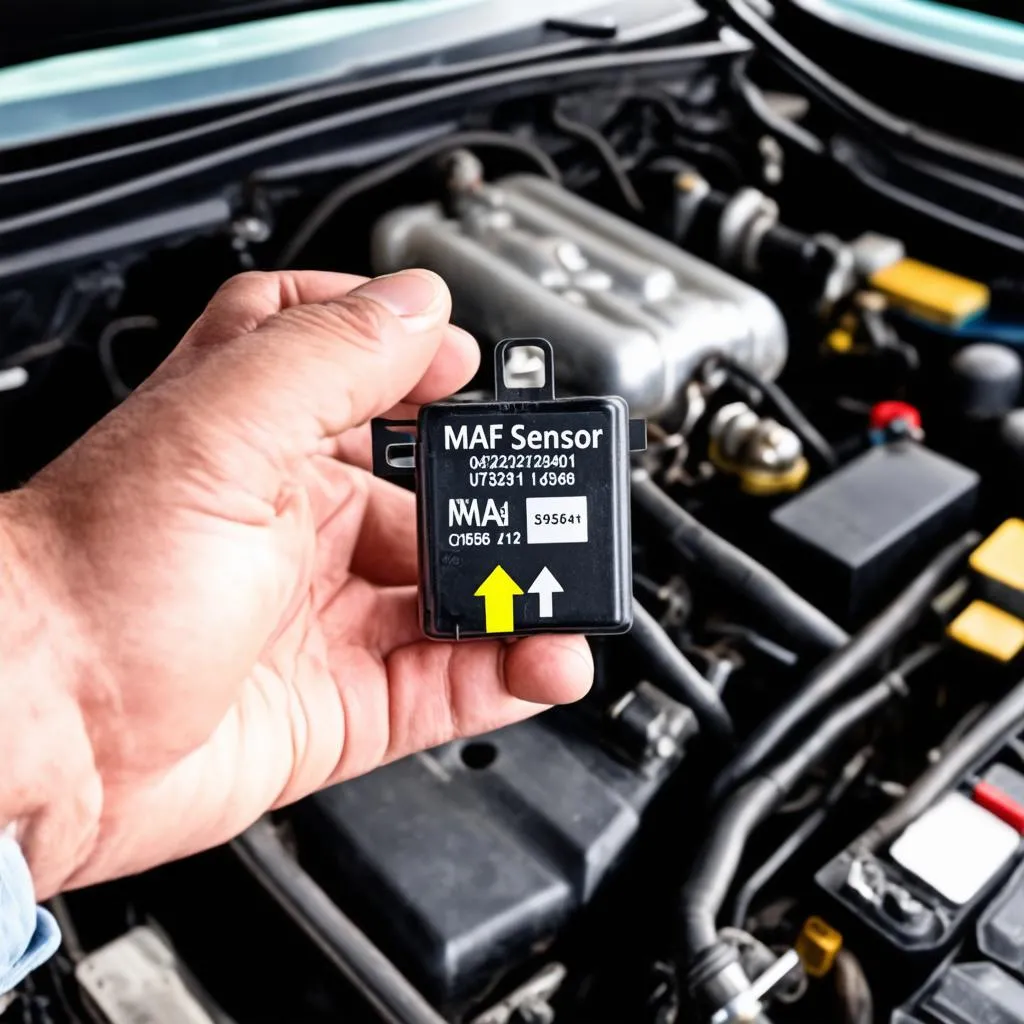Unlocking the Secrets of the VCDS MAF Sensor Test: A Comprehensive Guide
“A smooth sea never made a skilled sailor,” or so the saying goes. In the world of car maintenance, a similar principle applies. A car that never throws a code might seem idyllic, but it’s the challenges that truly teach us about our vehicles. Today, we’re diving deep into a common challenge faced by many European car owners: the dreaded “check engine” light and its connection to the Mass Air Flow (MAF) sensor, specifically using the VCDS diagnostic tool.
Deciphering the “VCDS MAF Sensor Test”: What Does It All Mean?
Imagine this: you’re cruising down the highway, enjoying the purr of your German engineering, when suddenly, the “check engine” light illuminates. A quick scan with your trusty VCDS reveals a fault code pointing to the MAF sensor. Panic sets in. What does it mean? How much will it cost? Is my beloved car about to fall apart?
Before you spiral into a vortex of despair, let’s demystify the “Vcds Maf Sensor Test” and understand its significance.
The Importance of the MAF Sensor: A Mechanic’s Perspective
Think of the MAF sensor as your car’s lungs. Just as we need the right balance of oxygen to function, your engine needs the perfect air-to-fuel ratio for optimal performance. The MAF sensor measures the amount of air entering the engine, relaying this crucial information to the Engine Control Unit (ECU).
A faulty MAF sensor can wreak havoc on your car’s performance, leading to:
- Reduced fuel economy: An inaccurate air reading can cause the ECU to inject too much or too little fuel, impacting your gas mileage.
- Rough idling and acceleration: A struggling engine can manifest as rough idling, hesitation, or stumbling during acceleration.
- Increased emissions: An imbalanced air-fuel mixture can lead to increased harmful emissions.
- Stalling: In severe cases, a malfunctioning MAF sensor can even cause your car to stall unexpectedly.
The Role of VCDS: Your Gateway to Automotive Enlightenment
Now, where does VCDS fit into this equation? VCDS, or VAG-COM Diagnostic System, is a powerful software tool designed specifically for Volkswagen Audi Group (VAG) vehicles. It allows you to communicate with your car’s ECU, read and clear fault codes, and perform various diagnostic tests, including the all-important MAF sensor test.
 VCDS MAF Sensor Test
VCDS MAF Sensor Test
The VCDS MAF Sensor Test: Unmasking the Culprit
The VCDS MAF sensor test essentially checks the functionality of your MAF sensor. By monitoring live data streams, you can observe the sensor’s readings and determine if they fall within the expected range. This test can help identify a few scenarios:
- A completely failed MAF sensor: The readings might be erratic, stuck at a certain value, or completely absent.
- A dirty or contaminated MAF sensor: The readings might be lower than expected, indicating a restriction in airflow.
- A wiring issue: The test might reveal inconsistencies in the signal being sent from the sensor to the ECU.
Performing the VCDS MAF Sensor Test: A Step-by-Step Guide
While the exact steps might vary slightly depending on your specific vehicle model, the general process for performing a VCDS MAF sensor test is as follows:
- Connect your VCDS interface to your car’s OBD-II port. This port is typically located under the dashboard on the driver’s side.
- Turn on the ignition but don’t start the engine. This will power up the ECU and allow it to communicate with the VCDS software.
- Launch the VCDS software on your computer and establish a connection with your car.
- Select the appropriate control module for your engine. This is usually labeled as “Engine” or something similar.
- Navigate to the “Measuring Blocks” or “Live Data” section.
- Locate the measuring block that displays the MAF sensor readings. This might be labeled as “MAF (Actual),” “Air Mass Flow,” or something similar.
- Observe the values displayed for the MAF sensor. Compare these values to the manufacturer’s specifications or to the readings from a known-good sensor.
 MAF Sensor Location
MAF Sensor Location
Beyond the Technicalities: A Holistic Perspective on Car Maintenance
In the realm of automotive care, it’s easy to get caught up in technical jargon and complex procedures. However, it’s crucial to remember that car maintenance is not just about fixing what’s broken; it’s about fostering a deeper connection with your vehicle.
Just as a doctor might recommend lifestyle changes to improve a patient’s overall health, taking a holistic approach to car maintenance can extend the life of your vehicle and enhance your driving experience. This includes:
- Regular servicing: Just like regular check-ups are crucial for our well-being, routine maintenance is vital for your car’s longevity. This includes oil changes, filter replacements, and fluid top-ups.
- Using quality parts: Your car is only as good as the parts you put into it. Using high-quality parts can make a significant difference in performance and reliability.
- Paying attention to your car’s needs: Your car often communicates its needs through subtle signs. Be attentive to unusual noises, vibrations, or changes in performance, and address them promptly.
Seeking Expert Guidance: The Power of Specialized Knowledge
Navigating the complexities of car maintenance can be daunting, especially for those unfamiliar with the intricacies of automotive technology. In such instances, seeking guidance from experienced professionals can be invaluable.
Just as we consult with doctors, lawyers, or financial advisors for their specialized knowledge, consulting with a qualified mechanic can provide:
- Accurate diagnosis: Experienced mechanics possess the expertise to diagnose problems effectively and recommend the appropriate course of action.
- Proper repairs: Attempting DIY repairs without the necessary skills can sometimes lead to more damage and higher costs in the long run.
- Peace of mind: Knowing your car is in capable hands can provide invaluable peace of mind and allow you to enjoy the open road with confidence.
Need further assistance with your VCDS or other diagnostic tools? Our team of automotive experts is available 24/7 to provide personalized support and guidance. Contact us via WhatsApp at +84767531508.
Exploring Further: Expanding Your Automotive Knowledge
If you found this article helpful, you might also be interested in:
- Audi A4 B5 VCDS Mass Air Flow Sensor Test
- Adjust Idle Speed MKV VCDS
- Requested Boost VCDS
- Golf R Fuel Cut No VCDS Codes
- VCDS Variable Intake Manifold
Remember, knowledge is power, especially when it comes to understanding and maintaining your vehicle.
Do you have any experiences or tips to share about VCDS or MAF sensor testing? Feel free to leave a comment below!
